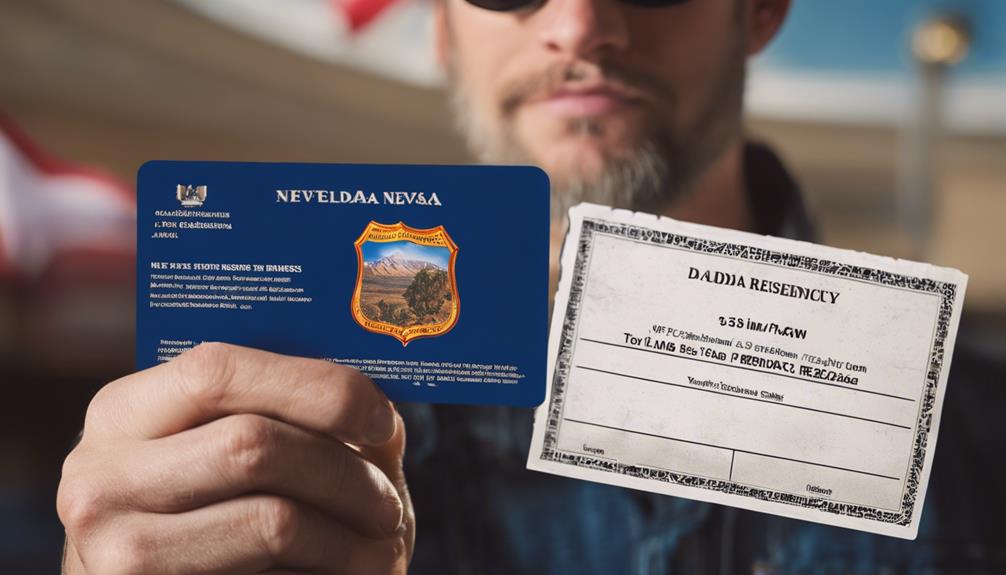If you're a non-resident startup eyeing Nevada for your business, ensuring compliance with legal guidelines is crucial.
Imagine a scenario where a tech startup founded by Canadian entrepreneurs seeks to establish its presence in Nevada. Navigating the legal landscape can be complex, but understanding the specific requirements for non-resident startups in Nevada is key to a successful venture.
From tax obligations to licensing considerations, each step plays a vital role in your startup's journey. Stay tuned to discover essential insights that will help you navigate the legal framework and set a solid foundation for your business in the Silver State.
Key Takeaways
- Register with Nevada Secretary of State and comply with tax laws for non-resident startups.
- Obtain necessary licenses and permits, follow zoning laws, and maintain accurate records.
- Understand the importance of a registered agent and tax obligations in Nevada.
- Explore tax advantages and business opportunities while utilizing networking and support resources.
Nevada State-Specific Regulations Overview
When establishing a non-resident startup in Nevada, it's imperative to navigate the state-specific regulations meticulously to ensure compliance and legal operation. Nevada requires businesses, including Limited Liability Companies (LLCs), to adhere to specific naming guidelines and registration procedures.
For non-resident startups, appointing a registered agent physically located in Nevada is a mandatory requirement. This registered agent serves as the official point of contact for the business within the state. Ensuring compliance with Nevada's Secretary of State regulations is crucial to maintaining good standing and avoiding any legal issues.
Understanding and fulfilling Nevada's tax requirements, such as the Commerce Tax, is also essential for non-resident startups. Failure to meet these tax obligations can result in penalties and fines. Additionally, non-resident startups may need to obtain specific business licenses and permits to operate legally in Nevada.
Formation of Non-Resident LLC in Nevada

Forming a non-resident LLC in Nevada involves filing Articles of Organization with the Nevada Secretary of State, designating a registered agent, and paying a $75 registration fee.
When forming an LLC in Nevada, it's crucial to ensure compliance with the state's naming regulations and to fulfill requirements for annual reports and business licenses.
Nevada offers convenient online filing options, simplifying the process for non-residents interested in establishing an LLC in the state.
By adhering to these steps, non-resident LLCs can enjoy advantages such as personal liability protection and pass-through taxation.
To operate legally in Nevada, the registered agent must be a person or entity authorized to do business in the state and available during regular business hours to receive legal documents and official correspondence on behalf of the LLC.
Following these guidelines is essential for the successful formation and operation of a non-resident LLC in Nevada.
Registered Agent Requirements for Non-Residents
Appointing a registered agent with a physical address in Nevada is a crucial requirement for non-resident startups looking to establish their presence in the state. When setting up your business, ensure you comply with this necessity to operate smoothly.
Here are some essential points to consider regarding registered agent requirements for non-residents in Nevada:
- Legal Point of Contact: The registered agent acts as the official point of contact for receiving legal and tax documents on behalf of your startup.
- Compliance and Penalties: Failure to maintain a registered agent in Nevada can lead to penalties or even the loss of good standing for your LLC.
- Availability: Registered agents must be available during regular business hours to ensure the timely receipt of important notices and communications.
- Professional Services: Consider using a registered agent service to efficiently fulfill this requirement and stay compliant with Nevada regulations.
Tax Obligations for Non-Resident Startups

To ensure compliance with Nevada regulations, non-resident startups must be aware of their tax obligations, particularly concerning the state's Commerce Tax if their revenue surpasses $4 million. The Commerce Tax is a vital consideration for non-resident startups operating in Nevada, as it is based on revenue and not on personal income tax. Below is a table summarizing key points about the Commerce Tax for non-resident startups:
| Aspect | Details |
|---|---|
| Tax Type | Commerce Tax |
| Applicability | Non-resident startups with revenue exceeding $4 million are subject to the tax. |
| Filing Requirement | Non-resident startups must file an annual Commerce Tax return if their revenue surpasses $4 million. |
| Exemption Threshold | Non-resident startups with revenue under $4 million may be exempt from the Commerce Tax obligation. |
Understanding these tax obligations is crucial for non-resident startups in Nevada to ensure they comply with the state's regulations and avoid any potential penalties.
Licensing and Permit Considerations

When establishing your startup in Nevada, it's crucial to understand the permit requirements, licensing process steps, and the importance of compliance with regulations.
First, you must determine the specific permits and licenses needed for your industry and business activities. Following the correct steps and ensuring full compliance will help you avoid penalties and legal complications down the line.
Permit Requirements Overview
Navigating the intricate world of permit requirements in Nevada is crucial for non-resident startups looking to establish legal operations in the state. Understanding the specific permit requirements and ensuring compliance with state and local regulations are fundamental steps towards achieving startup success.
Here are four key points to consider:
- Obtain the necessary business licenses for your industry and location.
- Be aware that permit requirements may vary depending on the type of business activity.
- Certain industries such as gaming or construction may have additional permit requirements.
- Maintaining compliance with state and local regulations is essential to avoid penalties or potential business shutdowns.
Licensing Process Steps
Understanding the licensing process steps is essential for non-resident startups aiming to establish legal operations in Nevada. To begin, obtain a Nevada state business license from the Secretary of State's office.
Next, ensure to check if your business activity necessitates additional county or city licenses within the state. Following this, apply for any specialized permits required for your specific industry or business operations.
If your business involves selling tangible goods in Nevada, consider obtaining a seller's permit as well. It's crucial to adhere to all licensing and permit requirements diligently to operate your non-resident startup legally in Nevada, ensuring compliance with the state's regulations and avoiding any potential legal issues.
Compliance With Regulations
To ensure compliance with regulations, non-resident startups in Nevada must meticulously obtain specific business licenses and permits tailored to their industry and business activities. Understanding and fulfilling licensing and permit obligations are crucial for maintaining compliance. Here are four key considerations to keep in mind:
- Licensing Requirements: Vary based on the type of business and industry.
- Zoning Permits: Ensure the business location is compliant with local zoning laws.
- Health Permits: Necessary for businesses handling food, health, or medical services.
- Industry-Specific Certifications: Some sectors require specialized certifications to operate legally.
Compliance Measures for Non-Resident Businesses

Ensuring compliance with Nevada's legal requirements is imperative for non-resident businesses looking to establish operations in the state. To maintain compliance, non-resident startups must appoint a registered agent located within Nevada. This registered agent serves as the liaison for legal matters and official communication.
Additionally, adherence to Nevada's business licensing and permit requirements is crucial for non-resident startups to operate within the bounds of the law.
Furthermore, non-resident businesses need to be well-versed in Nevada's tax laws and regulations. Understanding and following these tax laws is essential to avoid any compliance issues. It may also be necessary for non-resident startups to establish a physical presence or address in Nevada to conduct business effectively and comply with state regulations.
Understanding Nevada Sales Tax Implications

To grasp the nuances of Nevada sales tax implications, non-resident startups must be aware of how these regulations impact their business operations within the state. Understanding the intricacies of Nevada sales tax is essential for ensuring compliance and avoiding financial pitfalls. Here are four key points to consider for non-resident startups conducting business in Nevada:
- Varied Tax Rates: Nevada sales tax rates can range from 4.6% to 8.265%, depending on the location and the type of goods or services sold.
- Taxable Labor: Labor involved in manufacturing retail goods is subject to sales tax under Nevada regulations.
- Exempt Services: Generally, repair and installation labor services are exempt from sales tax in Nevada.
- Rental Property Tax: Rental properties in Nevada are subject to sales tax, with options for upfront payment or collection from renters.
Non-resident startups must carefully navigate these Nevada sales tax regulations for tax purposes to ensure their business operations align with state tax requirements.
Establishing Business Residency in Nevada

To establish business residency in Nevada, you must meet specific residency requirements tailored for startups. Understanding the benefits of Nevada residency is crucial for your business's legal standing and potential tax advantages.
Complying with the state's regulations and filing a Declaration of Domicile will ensure transparency and honesty in your claim of business residency in Nevada.
Residency Requirements for Startups
Establishing business residency in Nevada necessitates the establishment of a physical address and the registration of the business, crucial steps for foreign startups to meet residency requirements. To comply with Nevada's regulations and successfully establish residency, consider the following:
- Choose the right business entity: Select a suitable business structure that aligns with Nevada's requirements.
- Secure a physical address: Obtain a physical location within Nevada to serve as your business address.
- Register with the Secretary of State: File the necessary paperwork with the Secretary of State to formalize your business in Nevada.
- Ensure compliance: Adhere to all regulations set forth by the Secretary of State to maintain residency status.
Benefits of Nevada Residency
By establishing business residency in Nevada, non-resident startups can access valuable tax advantages and benefit from the state's favorable business environment. Nevada residency can open doors to tax benefits that can significantly impact your startup's bottom line.
Additionally, Nevada's business-friendly policies create an environment conducive to growth and innovation for non-resident startups. By meeting the requirements for establishing business residency, you can position your startup to thrive in a state known for its supportive regulatory framework.
Taking advantage of Nevada residency not only offers tax advantages but also aligns your business with a jurisdiction that prioritizes business success. Ensure compliance with Nevada's Secretary of State regulations to fully reap the benefits of Nevada residency.
Legal Implications for Non-Residents
When considering the legal implications of establishing business residency in Nevada as a non-resident, it's crucial to understand the requirements set forth by the state's Secretary of State regulations.
To establish business residency in Nevada, follow these key steps:
- Establish Physical Presence: Non-residents must have a physical address within Nevada to meet residency requirements.
- Register Your Business: It's essential to register your business in Nevada to comply with state regulations.
- Adhere to Secretary of State Regulations: Ensure full compliance with Nevada's Secretary of State regulations for establishing business residency.
- Fulfill Residency Requirements: By adhering to the terms of the Declaration of Domicile and meeting legal requirements, non-residents can successfully establish business residency in Nevada.
Benefits of Nevada Residency for Startups

For startups considering Nevada residency, the benefits extend beyond just tax advantages to encompass a business-friendly environment and a wealth of networking opportunities.
Nevada residency offers tax advantages, including no personal income tax and favorable business tax rates, which can significantly impact the bottom line of startups. Moreover, the state provides a business-friendly environment with minimal regulations and pro-business policies, enabling startups to operate with ease and efficiency.
Establishing residency in Nevada can enhance the credibility and reputation of startups, particularly in industries like technology and gaming, where the state holds a strong presence. Additionally, Nevada residency opens doors to potential partnerships and collaborations with other local businesses and industry stakeholders, fostering growth and innovation.
Legal Protections for Non-Resident Entrepreneurs

As a non-resident entrepreneur in Nevada, understanding visa requirements and the process of business registration is crucial for ensuring legal protections. By complying with visa regulations and appropriately registering your business, you can establish a solid legal foundation for your startup.
These initial steps are fundamental in safeguarding your rights and interests as a non-resident entrepreneur in Nevada.
Visa Requirements
Non-resident entrepreneurs seeking to establish businesses in Nevada must navigate the E-2 visa application process, requiring a substantial investment in a US business. To ensure a smooth visa application process, consider the following:
- E-2 Visa Benefits**: Understand the advantages of the E-2 visa, which allows you to live and work in the US to manage your business.
- Treaty of Commerce Requirement: Check if your home country has a treaty of commerce and navigation with the US, a prerequisite for the E-2 visa.
- Renewal Process: Learn about the renewal process for E-2 visa holders, which can be indefinite if the business remains operational and meets visa requirements.
- Legal Guidance**: Seek legal guidance to navigate the complexities of the visa application process and ensure compliance with US immigration laws.
Business Registration
Upon establishing your business in Nevada, registering it provides crucial legal protections for non-resident entrepreneurs seeking to safeguard their personal assets. Nevada business registration offers personal liability protection by separating personal assets from business liabilities. This separation ensures that non-resident entrepreneurs' personal assets are safeguarded in case of any business-related issues. By registering your business in Nevada, you can protect yourself from being personally accountable for any offenses related to your business activities. Take a look at the table below to understand how Nevada business registration can benefit non-resident entrepreneurs in terms of personal liability protection:
| Benefits of Nevada Business Registration |
|---|
| Separation of personal assets from business liabilities |
| Personal liability protection for non-resident entrepreneurs |
| Safeguarding personal assets in case of business issues |
| Preventing personal accountability for business-related offenses |
Frequently Asked Questions
Can I Open an LLC in Nevada Without Living There?
You can indeed open an LLC in Nevada without living there. With remote management, a virtual office, and legal representation through a registered agent, non-resident owners can navigate the incorporation process smoothly.
This setup allows flexibility and legal protection for your business operations. By designating a registered agent with a physical address in Nevada, you can establish and operate an LLC without the need for physical presence in the state.
How Do I Register an Out of State Business in Nevada?
So, you want to register your out-of-state business in Nevada.
Well, first things first, you'll need to navigate the process of submitting the Foreign Limited-Liability Company Application for Registration. This entails providing all necessary company details, appointing a registered agent within the state, and of course, paying those associated fees.
Do You Have to Live in Nevada to Incorporate There?
You don't need to live in Nevada to incorporate there. Incorporating remotely offers numerous business advantages, especially for non-residents. Nevada allows non-resident options for establishing and operating businesses without requiring physical presence.
Legal considerations are essential, but the state's business-friendly environment and legal protections make it attractive for non-resident startups. Nevada's flexibility in this regard provides ample opportunities for non-resident entrepreneurs looking to establish a business in the state.
What Is Required to Do Business in Nevada?
To do business in Nevada, you must consider tax implications, licensing requirements, business permits, and compliance regulations. Ensuring you have a Nevada state business license, registering with the Department of Taxation, meeting local county and city licensing needs, and filing necessary documents like Articles of Organization or Incorporation are crucial steps.
Maintaining compliance with Nevada business laws is essential to avoid penalties or legal issues.
Conclusion
As you navigate the legal guidelines for non-resident startups in Nevada, you'll find that the state offers a streamlined process for establishing an LLC. By following the necessary steps and obtaining the required documents, you can benefit from the legal protections and tax advantages that Nevada provides.
Make the smart choice for your business by taking advantage of the cost-effective and straightforward options available to non-resident entrepreneurs in the Silver State.